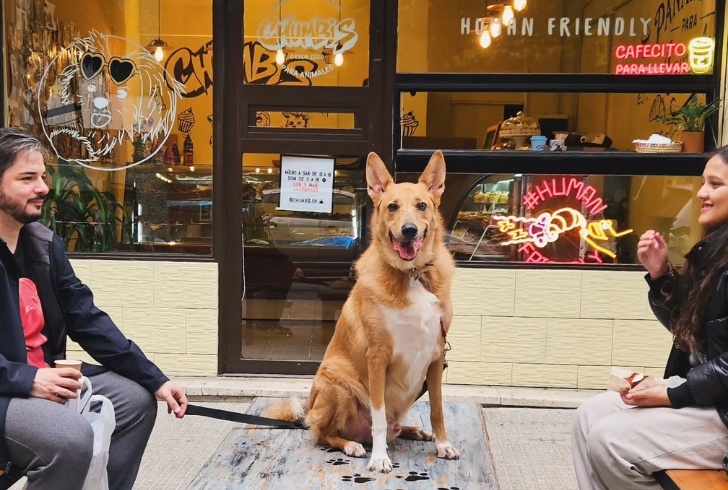Birthday hats, dog-friendly cakes, and teary-eyed speeches—scenes once reserved for kids’ parties now belong to four-legged guests of honor across Buenos Aires. It’s not just a passing phase. In a country where fewer people are having children, dogs are taking on new, deeply emotional roles in family life.
At Barto Cafe, a cozy bakery tucked away just south of Buenos Aires, Victoria Font lights candles on a meat-flavored cake. The celebration is for Venus, her mixed-breed dog.
“She’s not just my pet. She’s my daughter,” Victoria says with a laugh as she blows out the candles for Venus, who stares in curious silence.
Not long ago, this might’ve felt outlandish. But today, the city has one of the highest pet ownership rates globally, with nearly 80% of households having at least one animal companion. That’s well above major cities in the U.S. and far beyond regional neighbors. While Argentina’s birthrate continues to decline, dropping 6.5% just last year, dogs are becoming the emotional anchors for many households.

Freepik | Buenos Aires boasts a nearly 80% pet ownership rate, one of the highest globally.
In fact, there are now more dogs than children under 14 in Buenos Aires. Government statistics report over 493,000 registered dogs compared to 460,000 kids. And the shift isn’t just in numbers. Many now refer to themselves as “dog parents” rather than owners.
For Magalí Maisonnave, a 34-year-old stylist, her dachshund Sandro means everything. “He’s not a dog to me. He’s my little guy,” she shares while adjusting his River Plate soccer jersey before heading to a local match.
Economic hardship plays a big part in this shift. Buying a home or starting a family has become increasingly difficult for Argentina’s younger generations. Between unstable job markets and limited financial freedom, many find that dogs offer not only comfort but a sense of purpose.
Dr. Marcos Díaz Videla, who studies human-animal relationships, points out that the idea of family is evolving. “People are shaping their lives around their pets. Routines, rituals, even the way homes are designed—it’s all changing,” he explains.
This cultural transformation is visible in every corner of the city. From pet boutiques and cafes to luxury grooming salons and canine spas, Buenos Aires is fully embracing its dog-centric identity. At The Guau Experience salon, treatments can cost upwards of $120, a considerable portion of the average monthly income. Yet bookings stay full. Services include bubble baths, coat conditioning, nail treatments, and perfumed finishes.
And it doesn’t stop there. Argentina’s first dog bakery, Chumbis, offers a full menu featuring cookies, croissants, burgers, and canapés—crafted entirely from gourmet ingredients like chicken, pork, and beef.
Nicole Verdier, who founded Chumbis, puts it simply: “They’re with us for such a short time. It only makes sense to give them the best we can.”

Instagram | chumbis.ok | With a menu of gourmet chicken, pork, and beef goodies, Chumbis is Argentina's first dedicated dog bakery.
The growing connection has even birthed a new word—perrhijo—a blend of “perro” (dog) and “hijo” (child). It reflects a sentiment deeply felt across the city’s dog-loving population.
The influence reaches policy, too. Local politicians have pushed for legislation to support the growing canine community. Measures include easier access to public transport for pets and regulations for professional dog walkers, requiring training in animal behavior and emergency response.
Even the nation’s president, Javier Milei, is known for his bond with dogs. He moved into office with four cloned mastiffs named after American economists and refers to them as his “four-legged kids.” The public fascination surrounding them only strengthens the idea that dogs are no longer just pets—they’re family.
When that bond is broken, the grief is tangible. At Gardens of the Soul, a pet cemetery near Buenos Aires, families bury their companions with rituals once reserved for humans. Photographs, flowers, handwritten letters, and small tombstones fill the serene grounds.
Shelter manager Alicia Barreto recalls her first rescue, Mariano. Found abandoned in a bag of dead animals, she gave him a full life and a proper goodbye. “I’ll see him again,” she says softly beside his grave.
Argentina’s story is one of economic pressure, shifting values, and the search for meaning in companionship. Dogs have stepped in to fill emotional roles that society and tradition no longer define in the same way. What used to be called pet ownership now looks more like shared life, complete with birthdays, spa days, and lifelong devotion.
In Buenos Aires, and perhaps soon elsewhere, dogs aren’t just animals anymore. They’re loved, celebrated, and remembered like family.
